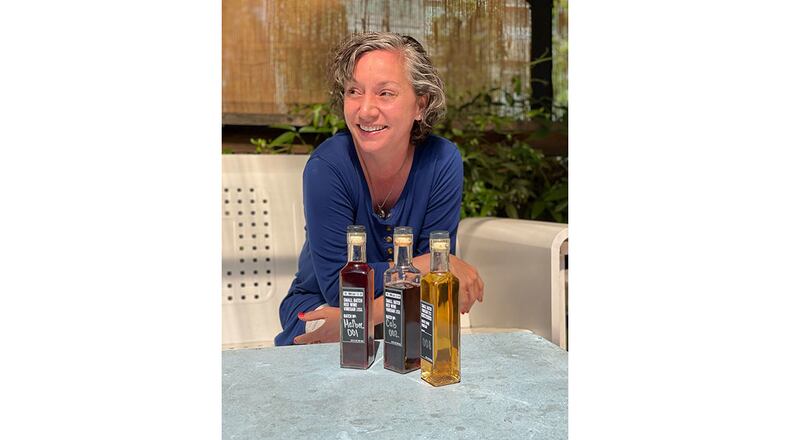Many years ago, Juliana Shields made a New Year’s resolution to waste less in the kitchen. “I love taking something like yesterday’s leftovers and turning them into something completely different,” she said. “It’s so satisfying.”
It wasn’t just leftover food. “I always had extra wine and I didn’t want to dump it,” Shields said. She decided to save the leftover wine for cooking. “I’m not even sure where I got the idea for vinegar,” she said, “but one day I bought a bucket, had a spigot added, and poured in some wine. I left it closed up for six or eight months, and pretty much forgot about it.”
When she checked the bucket, and took out a ladle full, “It was awesome. It was vinegar!”
Credit: M. Davis
Credit: M. Davis
That was the start of the Vinegar Co-op, her Duluth-based business that repurposes not only her wine, but leftover wine from others, such as restaurants.
Nowadays, Shields keeps anywhere from 20 to 30 batches of vinegar going. Most is in 5-gallon glass carboys, also called demijohns, but some is in liquor casks, like the tabletop wooden barrels you might find at a craft bar. And, she has a pallet of almost 50 cases of wine that she hasn’t even started to work with.
In 2015, she began doing research to turn this new passion into a business, after gifting her vinegar to friends. She reached out to colleagues and coworkers in the wine business (her day job is with Avant Partir) for open bottles they didn’t need. She “stole” her business name from a colleague, she said. “He had the idea of a place where salespeople could drop off their leftover wine and he could make vinegar, but he had no intention of doing it, and was happy to let me use the name.”
Starting up the business meant selecting bottles, designing a label, finding a commercial kitchen and getting licensed. Her commercial kitchen needs didn’t fit the typical model, where someone comes in, makes a batch of whatever, and then moves on until the next week. She needed a place where she could prepare her batches of wine, but also needed storage space, where the carboys could sit undisturbed for months.
The kitchen of the Garnergirls specialty food company turned out to be a great first solution. “They were so generous with their space and their enthusiasm,” Shields said. “When you’re trying to start anything, having even just one person excited for you means so much. It’s the push you need. Liz and Elise Garner were that support for me.”
When the Garners closed their business, Shields found her current location in Duluth.
Getting licensed through the Georgia Department of Agriculture meant asking for certification of something that was completely new to them. “They’re accustomed to certifying acidified foods, like pickles and barbecue sauce, but I was asking them to certify the acid itself,” Shields said. “I give them a lot of credit for being willing to research something they knew nothing about.”
How does she know when the vinegar is ready? “It’s by smell,” she said. “When the vinegar is almost ready, it actually smells like acetone, and, then, a week or two later, it’s vinegar. So, first I smell it, and then I taste it.”
The finished vinegar smells delicious, as if you could just drink it down, but this is very intense stuff. And, every batch of vinegar is different. Sometimes, she has enough of one wine to make a full batch, just with that varietal. Sometimes, she combines reds, for example, and makes a red wine vinegar, which will vary from batch to batch, because what went into the carboy varies. She’s currently working on a white wine vinegar that will be available the first of May.
Shields’ vinegars can be found at Staplehouse, Storico Fresco, Grant Park Market and Elemental Spirits.
Read more stories like this by liking Atlanta Restaurant Scene on Facebook, following @ATLDiningNews on Twitter and @ajcdining on Instagram.
About the Author
The Latest
Featured


